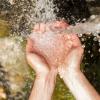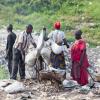
The SOS-Water Project, funded under the Horizon Europe scheme and coordinated by IIASA, will create a holistic and participatory assessment framework of a Safe Operating Space (SOS) for the entire water resources system to inform global and regional water management policies and pathways.
Water resources around the globe are under increasing stress. Among other factors, climate change, rising food and energy demand, and improving living standards have led to a six-fold increase in global water withdrawals over the last century, with significant consequences for water quality and availability, ecosystem health, biodiversity, as well as social stability.
The SOS-Water Project endeavors to set out the boundaries within which the Earth’s capacity to provide life-support systems for humanity is not endangered, and humanity’s capacity to adapt to environmental changes is not overburdened. Crossing such thresholds or tipping points in the complex Earth system could result in abrupt and irreversible ecological change. To safeguard a reliable and sufficient water supply for humans and ecosystems in the future, it is therefore essential to define an SOS for global water resources under changing conditions.
By advancing and linking water system models like the IIASA Community Water Model (CWatM) with models from sectors such as agriculture and energy, biodiversity, or sediment transport, the SOS-Water Project aims to lay the foundations for a holistic assessment framework of water resources across spatial scales. Based on five case studies of river basins in Europe and Vietnam – the Jucar River Basin in Spain, the Upper Danube region, the Danube and Rhine River deltas, and the Mekong River Basin – an interdisciplinary team of researchers from ten institutions across eight countries* will develop a multidimensional SOS for water. The framework will enable the assessment of feedback loops and trade-offs between different dimensions of the water system and help address pressing global, regional, and local challenges.
“This is vital for reaching the Sustainable Development Goals by 2030, and for achieving the objectives of the European Green Deal, the Biodiversity strategy for 2030, and those of various water policies in Europe,” explains Taher Kahil, leader of the Water Security Research Group in the IIASA Biodiversity and Natural Resources Program and one of the project’s principal investigators.
In addition to going beyond state-of-the-art water systems modeling, the project will develop a comprehensive set of indicators to assess and monitor the environmental, social, and economic performance of water systems. A strong emphasis will also be put on participatory research and inclusive stakeholder engagement. The participating researchers will collaborate with regional and local authorities, water user representatives, non-governmental organizations, and citizens to co-create future scenarios and water management pathways. By streamlining water planning at different levels, it can be ensured that water allocation among societies, economies, and ecosystems will be economically efficient, socially fair, and resilient to shocks.
“SOS-Water will raise awareness and enhance decision makers’ capacity to develop responsible and sustainable water management policies, create synergies with interest groups in and beyond the respective regions, and support more robust decision making for flood and drought risk reduction under climate change,” concludes IIASA Biodiversity and Natural Resources Program Director, Yoshihide Wada.
*The project consortium consists of ten partners from eight countries in Europe and Asia (Austria, Denmark, Germany, Italy, Netherlands, Romania, Spain, Switzerland, and Vietnam)
- International Institute for Applied Systems Analysis – coordinator
- Universiteit Utrecht
- Universitat Politècnica de València
- Politecnico di Milano
- Forschungsverbund Berlin E.V.
- FutureWater
- Institutul National de Cercetare-Dezvoltare pentru Geologie si Geoecologie Marina
- Southern Institute for Water Resources Planning
- Eutema Research Services GMBH
- Aalborg Universitet
- Eidgenoessische Anstalt Fuer Wasserversorgung, Abwasserreinigung und Gewaesserchutz
News

05 June 2024
The 2024 State of CDR Report: Scaling up CO2 removal to meet Paris Targets

23 April 2024
US Permanent Representative to International Organizations in Vienna visits IIASA

15 April 2024

